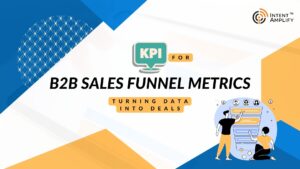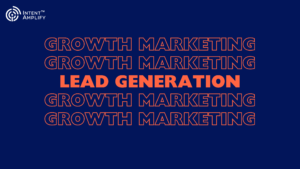
KPIs: Tracking B2B Sales Funnel Metrics at Every Stage
In the dynamic landscape of B2B sales, understanding and effectively tracking key performance indicators (KPIs) at each stage of the sales funnel is crucial for success. In this blog, we will delve deeper into the stages of B2B sales, focusing on how businesses can effectively utilize key performance indicators (KPIs) at each stage to enhance their sales funnel. We’ll discuss the specific KPIs relevant to each stage, providing insights into measuring awareness, analyzing prospect interest, assessing conversion potential, tracking conversions, and gauging customer satisfaction and retention.
Additionally, we will explore strategies for transforming raw data into actionable intelligence, emphasizing the importance of aligning KPIs with business objectives, consistent monitoring and analysis, comparative analysis, feedback loops with the sales team, and iterative refinement of strategies based on KPI insights.
Furthermore, we will highlight the role of tools and technologies in B2B sales metric tracking, showcasing the benefits of using Customer Relationship Management (CRM) systems, Business Intelligence platforms, Marketing Automation Software, Sales Performance Management tools, and analytical/reporting plugins. We shall also touch upon emerging technologies such as Artificial Intelligence (AI) and Machine Learning and how they contribute to predictive insights in B2B sales.
B2B Sales Tracking: KPIs for Each Stage of the Funnel

Awareness Stage
At the outset, focus on the key B2B sales funnel metrics of the awareness stage namely website traffic, page views, and social media interactions to gauge your brand’s ability to capture attention and generate awareness. These KPIs are essential for lead generation and gaining insights into your ideal customer profile.
Interest and Consideration Stage
As prospects show deeper interest, metrics such as time spent on content, webinar attendance, and content downloads become key indicators. These insights help nurture relationships and inform decisions regarding purchasing.
Evaluation Stage
Shift your focus to lead scoring, form submissions, and demo requests to understand the potential for converting leads into qualified opportunities. These KPIs provide insights into the effectiveness of your sales team in identifying decision-makers and advancing leads.
Decision Stage
The pivotal moment arrives when potential clients convert. Key B2B sales funnel metrics like conversion rates, deal values, and sales cycle duration offer insights into the effectiveness of your closing strategies.
Post-Sale Stage
After the sale, monitor customer satisfaction scores, repeat purchases, and referral rates to understand the impact of your sales process on long-term customer relationships.
Each stage has a unique set of KPIs that collectively paint a comprehensive picture of your B2B sales funnel’s health and effectiveness. Diligently tracking these metrics allows businesses to refine strategies and create a resonant sales journey, even when utilizing an outsourced Sales Development Representative (SDR) team.
Utilizing B2B Sales Funnel Metrics for Optimal Performance
When it comes to B2B sales, data is more than just numbers; it’s an asset that holds the key to enhancing performance, refining strategies, and achieving successful results. B2B sales funnel metrics, being the heartbeat of this data-driven approach, offer a host of insights waiting to be uncovered. Harnessing these insights requires more than just tracking numbers—it demands a strategic approach that transforms raw data into actionable intelligence which brings us to the next question.
How to Transform Raw Data into Insights?
Transforming raw data into actionable insights is the key to optimizing your B2B sales funnel. Here’s your roadmap:
1. Goals First: Start by aligning KPIs with your business objectives. Do you want more conversions, happier customers, or higher-quality leads?
2. Track & Analyze: Don’t just collect data, make it work! Regularly monitor your chosen KPIs to spot trends and patterns that fuel optimization, especially when refining your B2B sales cycle.
3. Benchmark Your Success: Context matters. Compare your current performance to past periods, industry benchmarks, or competitor metrics to understand where you stand.
4. Collaborate with Your Sales Team: SDRs have firsthand experience. Work together to interpret how tracked metrics impact cold calling and lead generation strategies.
5. Be Flexible: Data-driven decisions are key. Adapt your strategies based on what the KPIs reveal. Understanding decision-makers’ behavior requires agility.
6. See the Big Picture: Analyze how individual metrics connect to paint a complete picture of your sales funnel, especially when considering outsourcing sales development.
Tools and Technologies for B2B Sales Funnel Metric Tracking:
In the fast-paced world of B2B sales, staying ahead requires insightful metrics and the right tools to gather, analyze, and interpret data effectively. Explore these software solutions:
1. CRM Systems: Your central hub for tracking customer interactions, lead progression, and deal history. Think of it as your command center for monitoring key KPIs.
2. Business Intelligence: Dive deep with advanced data visualization tools. Customize dashboards and generate intuitive reports to uncover hidden trends and opportunities.
3. Marketing Automation: Track metrics across the entire funnel, including website visits, conversions, and lead engagement. Understand how marketing efforts directly impact sales outcomes.
4. Sales Performance Tools: Laser-focus on your sales team’s performance with dedicated tools. Track individual rep KPIs and identify areas for improvement.
5. Specialized Plugins: Enhance your analytics game with industry-specific plugins or integrations tailored to your unique business needs.
6. AI & Machine Learning: Embrace cutting-edge technology! Leverage AI and machine learning to generate predictive insights from historical data, guiding your sales decision-making.
Conclusion:
Optimizing B2B sales success depends a lot on the ability to best utilize the potential of key performance indicators (KPIs) at every stage of the sales funnel. With diligent tracking and analysis of these metrics, businesses can gain invaluable insights into their sales processes, customer behaviors, and market dynamics. An approach that is data-driven enhances performance and refines strategies while also ensuring a resonant and efficient sales journey. With advanced tools and emerging technologies at hand – such as CRM systems, Business Intelligence platforms, Marketing Automation Software, and AI – companies can transform raw data into actionable intelligence. These practices can help businesses stay ahead in the competitive landscape, paving the way for long-term success and fostering strong, lasting customer relationships.




